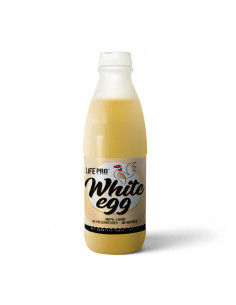Buy Egg ONLINE only best brands
Offers products from the Egg , at the best market price. Buy comfortably through the web and get gifts for all orders over 20 €.
WHAT IS IT AND WHAT ARE ITS NUTRITIONAL CHARACTERISTICS?
Eggs are foods of high biological value originating from hens (unless otherwise specified) suitable for human consumption and nutritionally similar to milk except that, unlike milk, they are kept fresh and unrefrigerated for a longer period of time.
Nutritional characteristics:
- Carbohydrates: very low quantity, barely 0.68% of the total
- Fats : they are mainly found in the yolk. They are composed of saturated fats and lectin.
- Proteins : it is one of the most complete protein foods. They are of high biological value. It contains the 8 essential amino acids ovalbumin is found in egg whites.
- Vitamins : the yolk contains soluble vitamins (A and D) and water-soluble vitamins such as B1 and B2 .
- Minerals : it is rich in iron, zinc, selenium, phosphorus and sodium.
- Water : mainly in the egg white (86%)
BENEFITS OF EGG CONSUMPTION
-It is a food rich in proteins, which help to maintain, recover and gain muscle mass . They prevent the loss of muscle mass.
-Contains two antioxidants called tryptophan and tyrosine. tyrosine helps fight fatigue and recover the energy we may lose during training. tryptophan helps the brain to secrete serotonin.
-In its composition we can find up to 22% selenium, which favours the functioning of the immune system.
-It has choline , which helps improve memory and reaction time
.
-Eggs contain vitamins A, D, E, B12, riboflavin and folate, and minerals such as iodine,
-Vitamin D among others is good for calcium balance in teeth and bones. Vitamin B is necessary for the formation of red blood cells.
WHAT ARE THE PARTS OF THE EGG THE YOLK AND THE WHITE
The egg is made up of two parts: the white and the yolk. In the white, we find around 65% of the total protein that an egg can contain. In the yolk, the remaining amount along with other vitamins and minerals.
THE YOLK
This is the yellow part of the egg. Its total weight of the egg is between 30% and 40%. It contains the vast majority of the fat in the whole egg and some of the total protein.One yolk, on average, has between 45 and 60 calories depending on the size of the egg.
Vitamins: contains a higher proportion of vitamins than egg whites, with two exceptions: riboflavin and niacin.
The yolk is a potent source not only of vitamins, but also of vitamins and minerals:
- Vitamin B1 or thiamine : plays an essential role in the nervous system, as it intervenes in the synthesis of acetylcholine and its derivative. It is a neurotransmitter. It contributes to energy generation due to its glycogen metabolism, participates in mitochondrial functions and is essential in cellular energy production processes.
- Riboflavin or B2: circulates in the blood bound to albumin and is absorbed in the small intestine by active transport. It aids in the transformation of proteins and fats and is involved in the formation of red blood cells and antibodies.
- Vitamin B6 or pyridoxine: acts as a coenzyme in the metabolism of amino acids. It is an essential vitamin for the correct functioning of enzymes and influences brain development during childhood and pregnancy and also has functions with the immune system.
- B9 or folic acid : it is key in development and its consumption is very important during pregnancy as it is essential for growth and DNA production, it is also involved in the synthesis of nucleotides and acts together with B12.
- Vitamin B12 or cyanocobalamin: is involved in protein metabolism. It is involved in the formation of red blood cells and in the maintenance of the central nervous system. In short, this vitamin is very important as it enables a number of vital functions such as energy production.
- Vitamin A : has an antioxidant role, the active compounds are carotenoids. It acts on certain pathologies such as cardiovascular diseases. They improve the immune system, have anti-infectious capacity.
- Vitamin E or tocopherol : it is involved as a stabiliser of cell membranes, in platelet aggregation and protection against haemolysis. It is a powerful antioxidant. It reduces the formation of LDL cholesterol, preventing cardiovascular and brain diseases.
- Vitamin D3 : it has to be transformed into hormone D3 or cholecalciferol to have biological activity. It is responsible for the regulation of calcium homeostasis. It is involved in foetal development (acts at placental level).
LA CLARA
The white is composed of almost 90% water. The rest is protein with minimal amounts of vitamins and minerals. Exactly, its composition is:
- 88% water
- 11% protein
- 1% carbohydrates
- 5% minerals
WHAT TYPES OF EGG PROTEIN SUPPLEMENTS CAN WE FIND AS A SUPPLEMENT?
- Egg protein isolate : they have a protein concentration of about 90% of the total product.
During the production process, most of the fat it may contain is eliminated
- Albumin protein: mostly comes from egg whites, they provide high amounts of branched amino acids and leucine, favouring protein synthesis and muscle mass development.
FITNESS PRODUCTS MADE WITH EGGS
They are increasingly used to manufacture products high in protein that facilitate the consumption of this macronutrient in various formats.
We can find everything from, the most common, protein powder to flans, pancake mixes or even shakes already made with this source and mixed with sweeteners to achieve different flavours.



